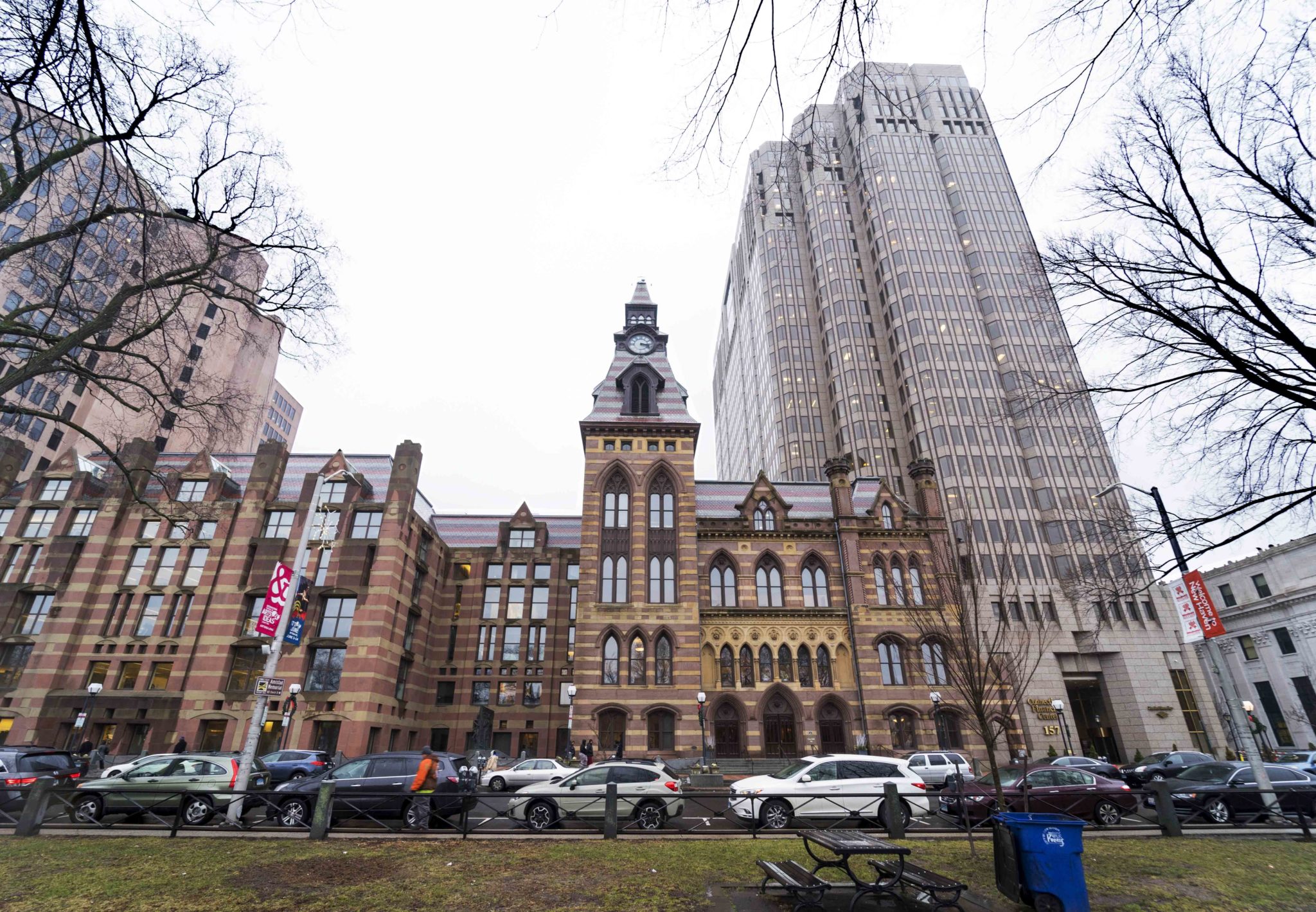In unprecedented move, Elicker unveils two budgets simultaneously
The move puts pressure on the state and Yale to provide additional funding.

Nat Kerman, Contributing Photographer
New Haven Mayor Justin Elicker introduced not one, but two budget proposals for fiscal year 2021-22 on Monday morning for the Board of Alders to review, emphasizing the dire economic decisions that lie ahead for the city.
The unprecedented move to submit two budgets to the board served as Elicker’s latest plea for financial support from the state of Connecticut and Yale University. One budget, proposed in case New Haven does not receive additional support from either and labeled the “Crisis Budget,” would raise taxes by 7.75 percent and include millions of dollars worth of layoffs. Three city buildings would also be effectively shut down: the Mitchell Library in Westville, the East Shore Senior Center, and the fire station on Whitney Avenue.
Elicker’s optimistic vision comes in the form of the “Forward Together Budget,” which would keep services and taxes as they currently are but would only be possible if Yale and the state provide a hefty increase in funding for the Elm City.
“The city’s budget crisis is one we need to get under control,” Elicker said. “We need to make very, very difficult decisions. Without a doubt, [the “Crisis Budget”] will significantly impact our ability to provide services to our residents as well as the cost to taxpayers. We do not want to pass this budget.”
City law mandates that the mayor must submit a budget to the Board of Alders by March 1 every year, and Elicker’s press conference officially began the city’s three-month budget season.
The proposed “Crisis Budget” follows several months of warnings from Elicker about the financial dangers that lie ahead for the city. At the center of the $589.1 million proposal is a tax hike of 7.75 percent, which would increase the city’s mill rate — which represents the rate of every $1 taxed for every $1,000 in property value — from 43.88 to 47.28. Elicker has continuously emphasized in the weeks leading up to the announcement that such tax increases would be unavoidable. The city’s expected deficit currently stands at $66 million for fiscal year 2021-22, assuming no further help from the state or Yale.
Beyond taxation, the budget also includes $2.6 million in “unspecified layoffs” for city government employees, as well as the net elimination of 16 currently vacant government positions.
Board of Education funding would remain constant with the “Crisis Budget,” as Connecticut state law prohibits New Haven from cutting education funding any further. According to Elicker, this would still hurt the city’s schools, as fixed costs are expected to rise even if allocated funds do not.
“The financial challenge[s] we face are a result of a structure in the State where municipalities, such as New Haven, cannot adequately collect enough revenue to fund the very services our residents need and many residents in the region rely on,” Elicker wrote in the proposed budget.
Elicker’s “Forward Together Budget,” on the other hand, would not impose a tax increase and would allow the city to continue operating its services as is. The $606.2 million proposal is reliant on a $53 million combined increase in funding from the state and Yale. The budget represents the sum required to maintain status quo city services.
City officials have aggressively pursued a proposal for increased state funds from the Payment in Lieu of Taxes, or PILOT, program spearheaded by Senate President Pro Tempore Martin Looney of New Haven. Over 50 percent of property in New Haven is non-taxable, in great part due to the University and Yale New Haven Hospital’s mass holdings. Under the PILOT program, the state is obligated to reimburse municipalities 77 percent of lost tax revenue from non-taxable properties. Due to a lack of funding for the program, however, New Haven is currently only reimbursed for 26 percent of the lost property taxes. Looney’s proposal looks to increase this to 50 percent of the intended 77, which could funnel an additional $49 million into New Haven’s pocket.
The Senate approved the proposal on Monday, but Elicker said there is still the possibility that the state could later decide not to fully fund the proposal. Due to this ongoing uncertainty, Elicker’s administration has continuously sought to pressure the University for an increased voluntary contribution. Elicker said he is on the phone with University President Peter Salovey “weekly, if not more” to try to work out a deal. Such conversations formed a pillar of Elicker’s mayoral campaign and first term platforms.
Elicker told those at the Monday press conference that the “Forward Together Budget” would rely on Yale making up whatever portion of the $53 million is not met by PILOT. He added that ideally the University’s contribution would be much greater, though he has refrained from saying how much he could request.
“We want to be able to invest in many more programs that will help our city thrive,” Elicker said. “We are cautiously optimistic that both [Yale and the state] will realize that we all need to be a part of a solution that sets us on the right course.”
The city’s current fiscal year budget is $567.9 million, meaning that the “Forward Together Budget” proposal would represent a 6.7 percent increase. Acting Budget Director Michael Gormany explained that this was due primarily to the city being required to meet increased pension payments, paying debt service and meeting obligations regarding employee salaries. He also noted that in both proposed budgets, the pension fund drops its annual rate of return from 7.75 to 7.25 percent.
“What is really driving that increase are fixed costs, and pensions are a very big driver of that,” Gormany said. “We made many cuts in order to minimize that increase.”
Elicker’s announcement has already sparked concern from those who would face the direct consequences of the “Crisis Budget.”
John Jessen, city librarian of the New Haven Free Public Library, told the News that the proposed closure of Mitchell Library would reduce the library system’s ability to serve the entire city.
“It would be a devastating cut for the community of users,” Jessen told the News. “The libraries in the city of New Haven are perfectly situated geographically to reach the most amount of people. Cutting off the Mitchell branch would mean the whole west side of the city would not have the services that people in any other part of the city would have.”
Jessen said library staff remain unsure what the closure would mean for employment and distribution of library materials, but he expects layoffs to be “minimal,” and that the majority of them would be the elimination of vacant positions. For now, the library is practicing what he called “parallel planning” — figuring out what it will have to do in the case of either budgets.
He also said he is remaining optimistic that the city will obtain the necessary funds and pass the “Forward Together Budget.”
“I’m hopeful from conversations I’ve had departmentally with the mayor,” he said. “It’s out right now, and everyone’s like ‘We have this amazing budget, and this horrible budget,’ and you just have to stay optimistic and wait until you actually have facts. We hope like hell that [the closure] is not gonna happen, but we’re ready if it does.”
The city must approve a new budget by July 1.
Thomas Birmingham | thomas.birmingham@yale.edu
Owen Tucker-Smith | owen.tucker-smith@yale.edu









